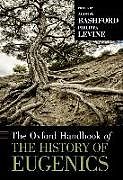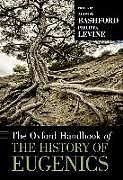The Oxford Handbook of the History of Eugenics
Einband:
Fester Einband
EAN:
9780195373141
Untertitel:
Englisch
Genre:
Naturwissenschaften allgemein
Autor:
Alison (EDT) Bashford, Philippa (EDT) Levine
Herausgeber:
Oxford Academic
Anzahl Seiten:
608
Erscheinungsdatum:
14.10.2010
ISBN:
978-0-19-537314-1
Zusatztext Both the beginner and the seasoned scholar should be able to find new and intriguing perspectives in this well-edited volume. Informationen zum Autor Alison Bashford Associate Professor of of History, University of Sydney; Philippa Levine Professor of History and English, University of Southern California Klappentext Eugenic thought and practice swept the world from the late nineteenth to the mid-twentieth century in a remarkable transnational phenomenon that informed social and scientific policy across the political spectrum! from liberal welfare measures in emerging social-democratic states! to feminist ambitions for birth control! to public health campaigns! to totalitarian dreams of the "perfectibility of man." This book dispels for uninitiated readers the automatic and apparently exclusive link between eugenics and the Holocaust: the popularity of eugenics in Japan! for example! comes as a surprise. It is the first world history of eugenics and an indispensable core text for both teaching and research in what has become a sprawling but ever more important field. Zusammenfassung Eugenic thought and practice swept the world from the late nineteenth to the mid-twentieth century in a remarkable transnational phenomenon that informed social and scientific policy across the political spectrum, from liberal welfare measures in emerging social-democratic states, to feminist ambitions for birth control, to public health campaigns, to totalitarian dreams of the "perfectibility of man." This book dispels for uninitiated readers the automatic and apparently exclusive link between eugenics and the Holocaust: the popularity of eugenics in Japan, for example, comes as a surprise. It is the first world history of eugenics and an indispensable core text for both teaching and research in what has become a sprawling but ever more important field. Eugenics has accumulated generations of interest as part of the question of how experts think about the connections between biology, human capacity and policy. In the past and the present, eugenics speaks to questions of race, class, gender and sex, evolution, governance, nationalism, disability, and the social implications of science. In the current climate, where the human genome project, stem cell research, and new reproductive technologies have proven so controversial, the history of eugenics has much to teach us about the relationship between scientific research, technology, and human ethical decision-making. This volume offers both a nineteenth-century context for understanding the emergence of eugenics and a consideration of contemporary manifestations of, and relationships to eugenics. It is the definitive text for students and researchers to consult for careful and up-to-date summaries, new substantive fields where very little work is currently available (e.g. eugenics in Iran, South Africa, and South East Asia); transnational thematic lines of inquiry; the integration of literature on colonialism; and connections to contemporary issues. Inhaltsverzeichnis Contributors; Abbreviations; Introduction; Eugenics and the modern world; Philippa Levine and Alison Bashford; Part One: Transnational themes in the history of eugenics ; 1.: The Darwinian context: Evolution and inheritance; Diane B. Paul and James Moore; 2.: Anthropology! colonialism! and eugenics; Philippa Levine; 3.: Race! science! and eugenics in the twentieth century; Marius Turda; 4.: Eugenics and the science of genetics; Nils Roll-Hansen; 5.: Fertility control: Eugenics! neo-Malthusianism! and feminism; Susanne Klausen and Alison Bashford; 6.: Disability! psychiatry! and eugenics; Mathew Thomson; 7.: Eugenics and the state: Policy-making in comparative perspective; VÚronique Mottier; 8.: Internationalism! cosmopolitanism! and eugenics; Alison Bashford; 9.: Gender and sexuality: A global tour and compass; Alexandra Minna Stern; 10.: Eugenics and genocide; A...
Autorentext
Alison Bashford Associate Professor of of History, University of Sydney; Philippa Levine Professor of History and English, University of Southern California
Klappentext
Eugenic thought and practice swept the world from the late nineteenth to the mid-twentieth century in a remarkable transnational phenomenon that informed social and scientific policy across the political spectrum, from liberal welfare measures in emerging social-democratic states, to feminist ambitions for birth control, to public health campaigns, to totalitarian dreams of the "perfectibility of man." This book dispels for uninitiated readers the automatic and apparently exclusive link between eugenics and the Holocaust: the popularity of eugenics in Japan, for example, comes as a surprise. It is the first world history of eugenics and an indispensable core text for both teaching and research in what has become a sprawling but ever more important field.
Inhalt
Contributors; Abbreviations; Introduction; Eugenics and the modern world; Philippa Levine and Alison Bashford; Part One: Transnational themes in the history of eugenics ; 1.: The Darwinian context: Evolution and inheritance; Diane B. Paul and James Moore; 2.: Anthropology, colonialism, and eugenics; Philippa Levine; 3.: Race, science, and eugenics in the twentieth century; Marius Turda; 4.: Eugenics and the science of genetics; Nils Roll-Hansen; 5.: Fertility control: Eugenics, neo-Malthusianism, and feminism; Susanne Klausen and Alison Bashford; 6.: Disability, psychiatry, and eugenics; Mathew Thomson; 7.: Eugenics and the state: Policy-making in comparative perspective; VÚronique Mottier; 8.: Internationalism, cosmopolitanism, and eugenics; Alison Bashford; 9.: Gender and sexuality: A global tour and compass; Alexandra Minna Stern; 10.: Eugenics and genocide; A. Dirk Moses and Dan Stone; Part Two: National/colonial formations ; 11.: Eugenics in Britain: The view from the metropole; Lucy Bland and Lesley Hall; 12.: South Asia's eugenic past; Sarah Hodges; 13.: Eugenics in Australia and New Zealand: Laboratories of racial science; Stephen Garton; 14.: Eugenics in China and Hong Kong: Nationalism and colonialism, 1890s-1940s; Yuehtsen Juliette Chung; 15.: Eugenics in South Africa: Paradoxes in the place of race?; Saul Dubow; 16.: Eugenics in colonial Kenya; Chloe Campbell; 17.: Eugenics in post-colonial Southeast Asia; Sunil S. Amrith; 18.: German eugenics and the wider world: Beyond the racial state; Paul Weindling; 19.: Eugenics in France and the colonies; Richard S. Fogarty and Michael A. Osborne; 20: . Eugenics in the Netherlands and the Dutch East Indies; Hans Pols; 21.: . The Scandinavian states: Reformed eugenics applied; Mattias TydÚn; 22.: The first-wave eugenic revolution in southern Europe: Science sans frontiÞres; Maria Sophia Quine; 23.: Eugenics in eastern Europe, 1870s-1945; Maria Bucur; 24.: Eugenics in Russia and the Soviet Union; Nikolai Krementsov; 25.: Eugenics in Japan: Sanguinous repair; Jennifer Robertson; 26.: Eugenics in interwar Iran; Cyrus Schayegh; 27.: Eugenics and the Jews; Raphael Falk; 28.: Eugenics policy and practice in Cuba, Puerto Rico, and Mexico; Patience A. Schell; 29.: The path of eugenics in Brazil: Dilemmas of miscegenation; Gilberto Hochman, NÝsia Trindade Lima, and Marcos Chor Maio; 30.: Eugenics in the United States; Wendy Kline; 31.: Eugenics in Canada: A chequered history, 1850s - 1990s; Carolyn Strange and Jennifer A. Stephen; Epilogue: Where did eugenics go?; Alison Bashford; Chronology; Index

Leider konnten wir für diesen Artikel keine Preise ermitteln ...
billigbuch.ch sucht jetzt für Sie die besten Angebote ...
Die aktuellen Verkaufspreise von 6 Onlineshops werden in Realtime abgefragt.
Sie können das gewünschte Produkt anschliessend direkt beim Anbieter Ihrer Wahl bestellen.
Loading...
Die aktuellen Verkaufspreise von 6 Onlineshops werden in Realtime abgefragt.
Sie können das gewünschte Produkt anschliessend direkt beim Anbieter Ihrer Wahl bestellen.
| # | Onlineshop | Preis CHF | Versand CHF | Total CHF | ||
|---|---|---|---|---|---|---|
| 1 | Seller | 0.00 | 0.00 | 0.00 |
